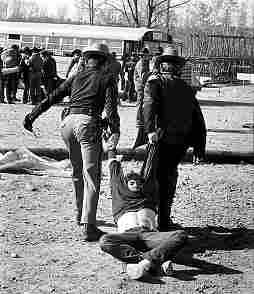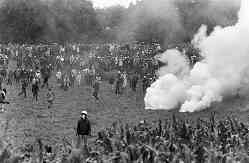Rudy Perkins
Rudy Perkins
Did Pacifists Block Militant Action?
Groups Excluded; Cooperated With Authorities at Seabrook

.

Caption for photos:
Contrasted with the U.S., European anti-nuclear demonstrations often result in violent clashes with police. Scene above (l.) shows a Clamshell demonstrator practicing nonviolence being dragged away by a New Hampshire State Trooper, May 1 at Seabrook, At right, part of a contingent of 30,000 who tried to march on a plant site at Creys-Malville, France, July 31. One demonstrator was left dead and a hundred others injured after police attacked, trying to block access to the plant. French Interior Minister Christian Bonnet issued a statement saying, “About a fifth of the demonstrators were foreigners. Among them were about a thousand troublemakers, indisputably anarchist in action and inspiration who ignore frontiers and who already have made trouble elsewhere, especially in West Germany.”
Dec 26, 2017 Read the whole text...
E.B. Maple (Peter Werbe)
Rudy Perkins
On Poland and Power
Coordination & Electricity
Thanks again for running my article on Poland, and for E.B. Maple’s reply. (See FE #309, June 19, 1982, “The Collapse in Poland”) Maple seems a little over-anxious for a dispute on the questions raised, in some cases going out of his way to misinterpret what I say, and to ignore parts of the article in which I clearly distinguish the revolutionary movement from the organizations which speak for it, and from the capitalist state which cannot be reformed or seized. Still, there are several points on which we genuinely disagree.
Jun 1, 2019 Read the whole text...
Rudy Perkins
The Collapse in Poland
“Winter is yours, Spring is ours!”
—Solidarity
Painted across a thousand walls in Poland, this promise reminds us that the democratic upsurge there is far from buried. A certain phase of the movement has ended. When the movement reappears its form will be different, advanced by the lessons of a year and a half in the open air, and by the lessons of December’s defeat.
Mar 17, 2019 Read the whole text...
Rudy Perkins
The State & Nuclear Power
Related: see “Technology and the State: An Introduction” in this issue.
For the anti-nuclear movement the question “What forces have pushed the development of nuclear power in the U.S.?” should be an important one. For in the cause one usually finds the cure. The fact that this question is so infrequently raised, and where raised, so narrowly answered, says something about the nature of American opposition to nuclear power at this time.
Jun 20, 2018 Read the whole text...
